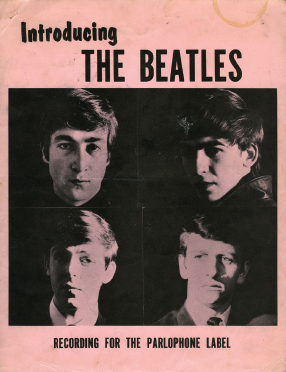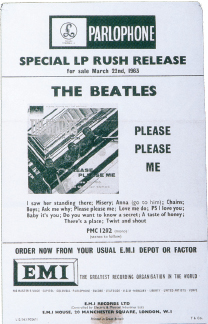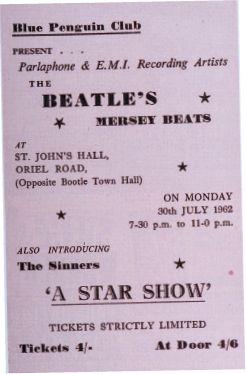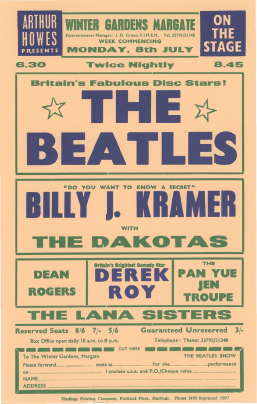George Martin was interested, but not wildly impressed, being particularly worried about Pete Best’s drumming. When he asked, after they had finished the session, whether there was anything they didn’t like, George Harrison replied in his dead-pan, guttural tones, ‘Your tie.’ Fortunately, George Martin laughed, as did the other engineers.
After a wait which, to the Beatles, afraid they would not be given a second chance, had seemed to drag on for an eternity, they were called back to the EMI recording studios three months later, on 4 September. George had a black eye that day, having been punched in the Cavern by some girl’s jealous boyfriend. Ringo had by this time joined them on drums. They did ‘Love Me Do’ again and also recorded a song George Martin was very keen on, ‘How Do You Do It?’ written by Mitch Murray. Martin was convinced it was going to be a number one hit (which it was the following year, recorded by Gerry and the Pacemakers.)
They performed ‘How Do You Do It?’ as requested, but recorded it without too much enthusiasm, still preferring their own, home-made songs for their debut. Paul has said that he was embarrassed by ‘How Do You Do It?’ and feared he would be mocked in Liverpool if that became their first record.
George Martin had them back again a week later and this time agreed to have another go at ‘Love Me Do’–but he had hired a session musician, Andy White, to play on drums–a fairly normal procedure in recording studios, but a massive disappointment for Ringo.
They were all nervous, and fiddled with their headphones, which they had never used before. Paul was particularly worried when George Martin decided that he, Paul, should sing the solo vocal line ‘Love, love me do’ on his own, rather than John, which was how they had always done it on stage. John for years had managed to play his harmonica after he had sung the line, but Martin felt he was garbling the last word, so it was coming out as ‘Love love me waahhhh…’ He therefore suggested that Paul should sing that line instead, on his own, which worried Paul as he knew that his voice was not as deep as John’s. Listening carefully to it now, you can detect Paul’s nerves, forcing his voice lower.

Parlophone’s first press handout for the Beatles, October 1962, for ‘Love Me Do’.
‘Love Me Do’ was released on 5 October 1962, with another of their own songs, ‘PS I Love You’ on the other side. ‘Love Me Do’ crept quietly into the charts. It was rumoured that Brian Epstein gave it a push by buying ten thousand copies for his own record store, though probably it was no more than 2,000–but it only ever got as far as number 17. However, this was good for a debut. In the USA, Capitol Records initially did not release it–nor did they fancy ‘Please Please Me’, the Beatles’ second single, released in January 1963.
Please Please Me, their first album, was recorded in a single day, 11 February 1963, at the Abbey Road Studios.* The big achievement with this first tranche of songs was to have done it–to have got the tracks recorded and released. The other, more interesting element is that they had got away with recording so many of their own compositions, despite being a brand-new band, unknown outside Merseyside.
On that first album, all they did was repeat their stage performances, recording most of them in a single take. There was no double tracking in those days. And if you made a mistake, you had to do the whole thing again.
Technical tricks and facilities were few, but George Martin, being an experienced producer with the benefit of an education in classical music, worked hard to get the sound he required, dictating what he did and did not like, instructing them on what he wanted–such as using a different drummer, or having Paul take over a solo–and suggesting arrangements.

EMI exhort the trade to take orders for their first LP, Please Please Me, in May 1963.
What he did not do–and never did, even later on–was mess around with their words. There is no evidence, and none of them has any recollection, of George Martin ever being unhappy with their lyrics–certainly not to the extent of making them change words or work on lines. Perhaps he didn’t really care; lyrics to pop songs were considered trivial and inconsequential. Perhaps Martin was satisfied that John and Paul seemed to know what they were doing when it came to their lyrics–and to have fairly strong opinions–so he was content to let them get on with it.
The most interesting aspect of these early lyrics, rereading them now, is not their subject matter–romantic boy–girl love, or miserable romantic boy–girl love–but the lack of sexual content.
When the Beatles made their breakthrough, they were generally thought to be attractive–why else would girls be screaming at them? Parents, however, feared that they might be a corrupting influence with their long hair and loud music. Many parents went so far as to consider them dangerous, which now seems laughable. If you study the actual lyrics now, they are almost entirely wholesome, healthy, benign. Compared to Elvis, Chuck Berry, Little Richard (or Mick Jagger, when he arrived on the scene a year later), all of whom deliberately emphasized the sexual element in their songs and stage performances, aiming to be raunchy, the Beatles seem positively chaste.
Professor Colin Campbell, in his exhaustive 1980 concordance of the lyrics, established that the word ‘sex’ or ‘sexy’ appears only once in the entire Beatles canon (‘Sexy Sadie’, and even then it is not about sex at all, as we shall see). Only once, in all those lyrics. I was surprised. It is true there is a smutty double entendre in ‘Penny Lane’, but you have to be from Liverpool to spot it.
In addition to being clean, in the sexual sense, Beatles lyrics are awfully well-mannered. The word ‘please’ features in seven of their early songs: ‘Love Me Do’, ‘Please Please Me’, ‘Don’t Bother Me’, ‘I Want to Hold Your Hand’, ‘You Can’t Do That’, ‘If I Fell’, ‘When I Get Home’. How polite is that?

Early poster, with the spelling of Parlophone and Beatles still a bit of a puzzle.

National tour in 1963 with Billy J. Kramer.
Love Me Do
With ‘Love Me Do’, the Beatles were at last out, in the shops, on the streets, in the air, on the jukeboxes, though not many people at the time could possibly have imagined that so much would develop from such a simple, basic song. Even though I have traced no manuscript, it is still worth printing all the words, hang the expense, including all the repetitions, just to see how basic they were.